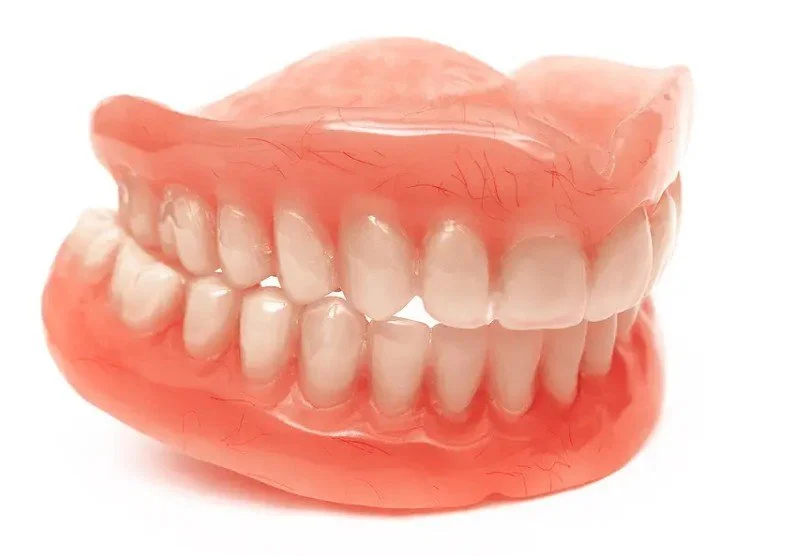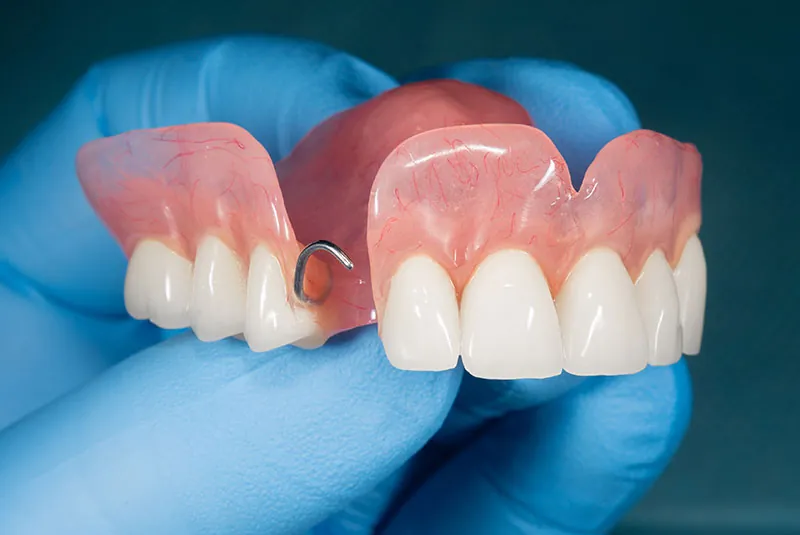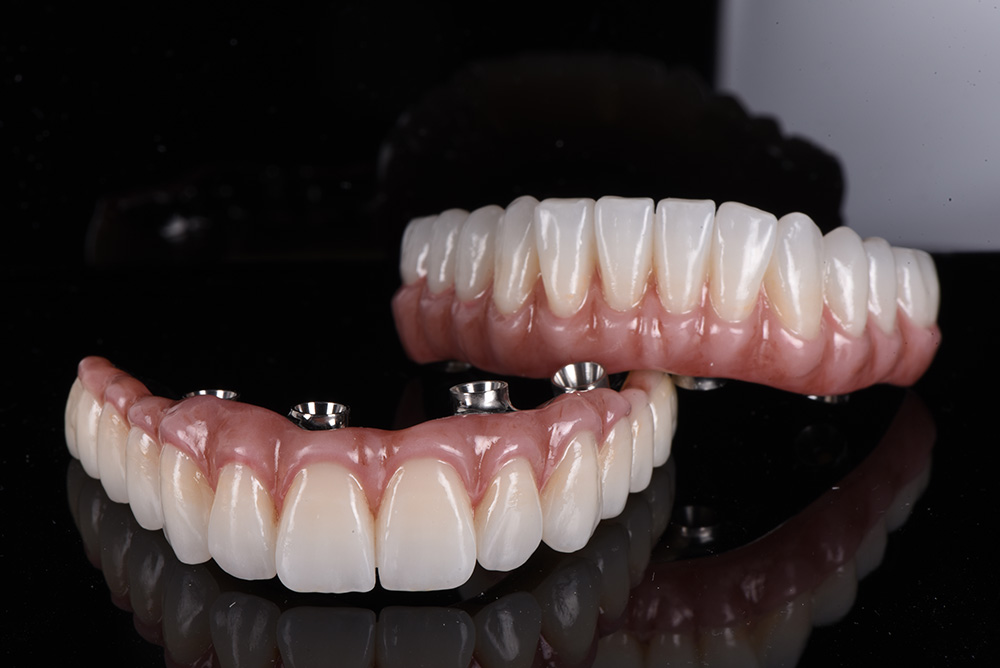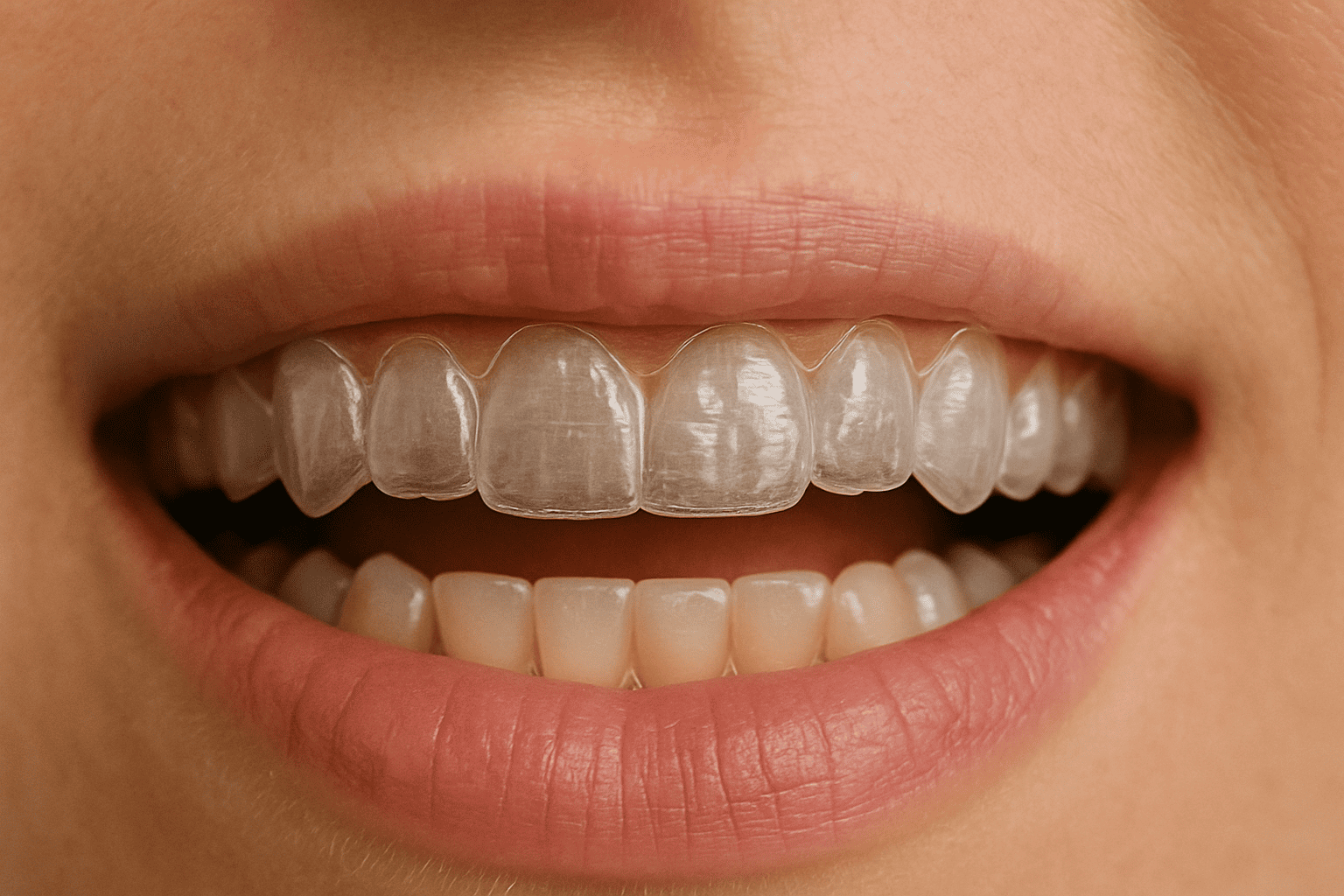A Complete Guide About Dentures
Missing teeth? We’ll explore denture types, their benefits, drawbacks, and care tips to help you choose the best solution for a confident smile.

Tooth loss is more common than you might think. Around 11% of adults in the UK wear dentures, with that number jumping to 39% for those over 75. Whether it’s due to aging, gum disease, injury, or decay, missing teeth can make eating, speaking, and smiling feel challenging. Thankfully, dentures are here to help. These removable devices replace missing teeth and fill in gaps, restoring your ability to chew, speak clearly, and display a confident smile. In this guide, we’ll walk you through the main types of dentures available in the UK, their benefits, drawbacks, and how to care for them.
Our goal is to help you understand your options so you can chat with your dentist to find the perfect fit. From simple designs to cutting-edge solutions, dentures today cater to your unique needs.
What Are Dentures?
Dentures, also known as false teeth, are custom-made replacements for missing teeth. Unlike natural teeth, which are held in place by roots in your jawbone, dentures sit over your gums or connect to remaining teeth or implants. They’re made with a base, often acrylic, metal, or flexible materials like nylon, and topped with artificial teeth crafted from porcelain or strong plastic to look natural.
Dentures do more than just fill gaps. They help you chew food properly for better nutrition, make speaking easier, and restore the appearance of your smile, boosting your confidence. They also support your facial structure, preventing sagging or shifting teeth that can happen when teeth are missing. Dentures are an excellent option for adults who are dealing with partial or complete tooth loss due to aging, gum issues, injuries, or decay.
Compared to fixed options like dental implants or bridges, dentures are removable, which makes cleaning straightforward and often keeps costs lower. They’re built from durable acrylic for the base, flexible nylon for comfort, or sturdy metal for partial dentures. 11–15 million adults in the UK use dentures, a trusted way to bring back function and flair to your smile.
How Dentures Are Made and Fitted
Denture fabrication begins with a check-up, which includes X-rays and impressions of your gums and teeth to assess the condition of your jawbone. Molds (using soft materials or digital scans) create a model of your mouth. A wax version lets you test the fit and look, ensuring your bite and smile are just right. The final denture is crafted in a lab, polished for comfort, and fitted over several visits to tweak any soreness or speech issues. In the UK, NHS patients might wait a bit longer, while private care offers faster, tailored results. After tooth extractions, conventional dentures require 8–12 weeks for the gums to heal. Every 1–2 years, a reline may be necessary to keep them snug as your mouth changes.
The Main Types of Dentures
Dentures come in two main groups: complete (for all teeth missing in a jaw) or partial (for some missing teeth), and they can be removable or fixed with implants. Your choice depends on how many teeth you’ve lost, your jawbone health, and what feels right for your lifestyle. Here’s a closer look at the main types in
the UK, plus a handy comparison table.
1. Complete (Full) Dentures
What they are: These replace all teeth in your upper or lower jaw (or both) when no natural teeth remain. Made with a gum-colored acrylic base, they sit on your gums, using suction or adhesive for stability. Upper dentures cover the roof of your mouth, while lower ones are shaped to fit around your tongue.
Who they’re for: Perfect for those who’ve lost all teeth in one jaw due to gum disease, decay, or injury, usually fitted after gums heal (8–12 weeks post-extraction).
Benefits: Restores chewing, speaking, and your smile; prevents a sunken face.
Drawbacks: Can feel loose at first; may need adhesive; might irritate gums; requires relining as the jawbone shrinks.
Who it suits: People with full tooth loss looking for a budget-friendly, non-surgical option.

2. Partial Dentures
What they are: These fill gaps when you still have some healthy teeth, using a framework of metal
(cobalt-chrome), acrylic, or flexible nylon that clips onto your remaining teeth.
Who they’re for: Great for those with a few missing teeth who want to keep their natural teeth without surgery.
Benefits: Stops remaining teeth from shifting, improves chewing and appearance, and is easy to clean.
Drawbacks: Metal clasps might show; could stress anchor teeth; flexible versions are less durable.
Who it suits: People with some healthy teeth or those wanting a cosmetic, metal-free option.

3. Immediate Dentures
What they are: Temporary dentures placed right after tooth extractions, made from pre-extraction measurements.
Who they’re for: Ideal for those who need to keep their smile and function while gums heal before getting permanent dentures.
Benefits: Maintains your appearance and speech; aids in gum healing.
Drawbacks: Needs adjustments as gums change (up to 12 months); not a long-term solution.
Who it suits: Those needing a quick fix post-extraction.
4. Implant-Supported Dentures (All on 4, all on 2 prostheses)
What they are: These dentures clip onto 2–4 titanium implants in your jawbone, offering a secure fit. They can be removable (snap-in) or fixed.
Who they’re for: People with enough jawbone who want a stable, natural-feeling denture, especially for wobbly lower jaws.
Benefits: Super stable; prevents bone loss; feels natural; no palate coverage for upper comfort.
Drawbacks: Requires surgery; more expensive than conventional dentures.
Who it suits: Those prioritizing stability and are okay with surgical costs.

5. Flexible Dentures
What they are: Lightweight, nylon-based partial dentures without metal clasps, blending seamlessly with gums.
Who they’re for: Those with partial tooth loss, metal allergies, or who prioritize looks.
Benefits: Comfortable; lightweight; less irritation; natural-looking; not too expensive.
Drawbacks: Less durable; not ideal for significant tooth loss.
Who it suits: Individuals with cosmetic-focused or temporary partial needs.

Benefits and Drawbacks of Dentures
Dentures can transform your daily life by making eating, speaking, and smiling easier. Here’s a clear look at what they offer, along with some challenges to consider.
Pros:
- Easier Eating: Dentures let you chew a wider variety of foods, improving nutrition and enjoyment.
- Clearer Speech: They help you speak more clearly, boosting confidence in conversations.
- Youthful Appearance: Dentures support your face, preventing a sunken look and keeping your smile vibrant.
- Customizable and Affordable: With numerous options, they’re tailored to your specific needs and budget.
- Bone Protection with Implants: Implant-supported dentures feel natural and help maintain your jawbone.
Cons:
- Possible Slippage: Non-implant dentures may shift, especially lower ones, and might need adhesive.
- Gum Irritation: Some types can cause soreness, though adjustments help.
- Jawbone Changes: Non-implant dentures don’t prevent bone shrinkage, requiring relines every 1–2 years.
- Surgical Costs for Implants: Implant options are pricier and involve surgery.
- Adjustment Period: Initial discomfort or speech changes are common but improve with time.
- Lifestyle Factors: Your diet affects how well dentures work. Online reviews often highlight flexible dentures for comfort and implants for a secure fit.
Care and Maintenance of Dentures
Taking care of your dentures can help them last 5–10 years and keep your mouth healthy. Follow these simple steps for the best results:
- Daily Cleaning: Use a soft brush and gentle denture paste to clean dentures every day.
- Overnight Soaking: Soak dentures in water or denture solution at night to prevent warping.
- Mouth Hygiene: Brush your gums and tongue daily to keep your mouth fresh and healthy.
- Rest Your Gums: Remove dentures for 8 hours daily to give your gums a break.
- Avoid Harsh Cleaners: Skip hot water, bleach, or abrasive cleaners to protect your dentures.
- Implant Care: For implant-supported dentures, clean around implants to prevent infection.
- Regular Check-Ups: Visit your dentist for adjustments and relines every 1–2 years as your mouth changes.
- Avoid Over-the-Counter Options: Poorly fitted store-bought dentures can cause discomfort and harm.
Frequently Asked Questions
How are dentures different from natural teeth?
Dentures are removable and sit on gums, unlike rooted natural teeth. They mimic looks and function but may feel less stable unless implant-supported.
Are dentures permanent or removable?
Most (complete, partial, immediate, overdentures, flexible) are removable; All-on-4 and some implant-supported dentures are fixed, removed only by a dentist.
Do dentures affect eating and speaking?
At first, they may feel strange, but most people adjust quickly. Implant-supported dentures offer the best chewing and speaking experience.
How comfortable are they?
Flexible and implant-supported dentures feel lightest and most natural; complete dentures may take time to get used to. Adjustments improve comfort.
Which lasts longest?
Implant-supported and All-on-4 dentures can last 10–20 years or more; traditional ones last 5–10 years with care.
Which looks most natural?
Implant-supported, All-on-4, and custom cosmetic dentures closely resemble real teeth due to the use of high-quality materials and precise design.
Are dentures safe for everyone?
Most adults can use them, but implants require a healthy jawbone and good overall health for successful surgery. Your dentist will check what’s best for you.
What are the risks?
Slippage, gum irritation, or bone loss (less with implants) can occur. A poor fit may cause discomfort or difficulty with chewing.
Can dentures cause gum or jaw issues?
Poorly fitted dentures may irritate gums. Regular care and adjustments prevent problems.
Are there alternatives?
Dental implants or bridges are fixed options. Palateless implant dentures improve comfort.
Conclusion
Dentures are a game-changer for anyone facing tooth loss, helping you eat, speak, and smile with ease. With seven types to choose from—complete, partial, immediate, implant-supported, flexible, and All-on-4—there’s a solution for every need, whether you’re after affordability or a permanent fix. Available at our clinic, dentures work best when tailored by a dentist to your mouth and lifestyle. With innovations like 3D printing and smart scans, dentures are blending tradition with modern tech for better results. Book a visit with us to find the right denture for you and rediscover your confident smile!






